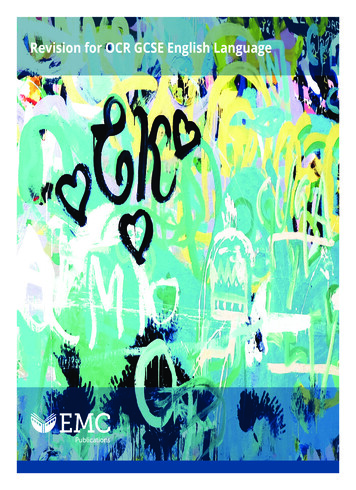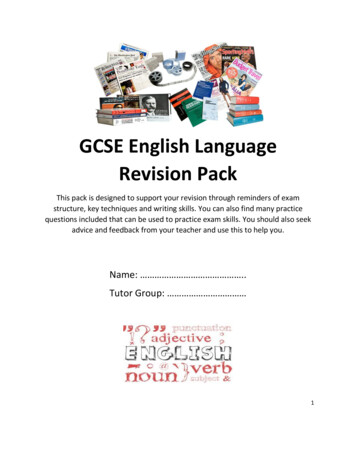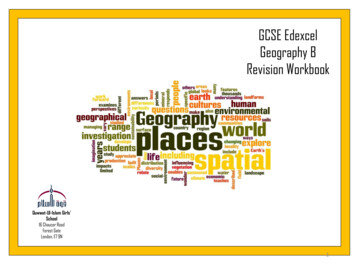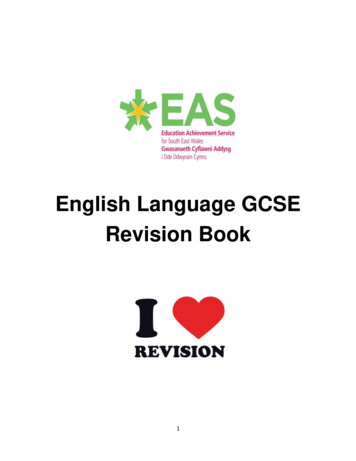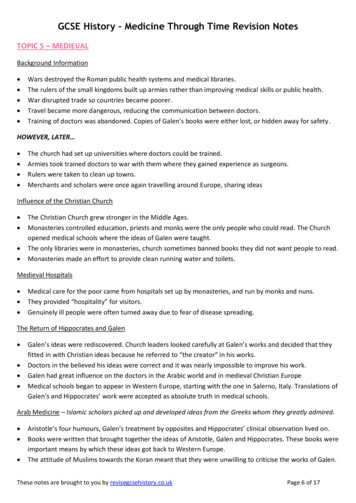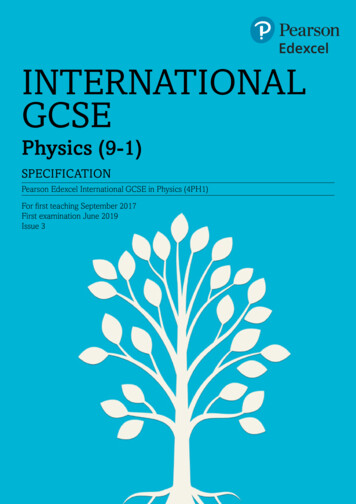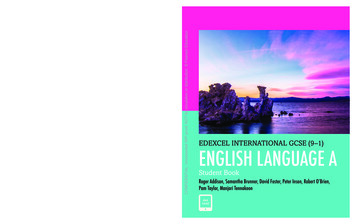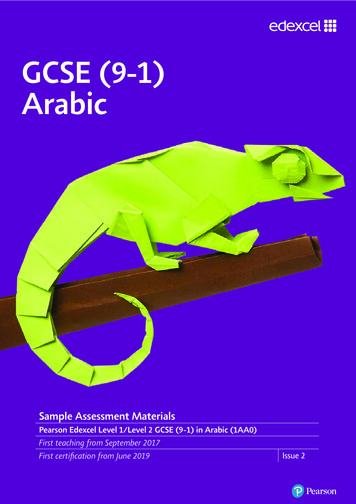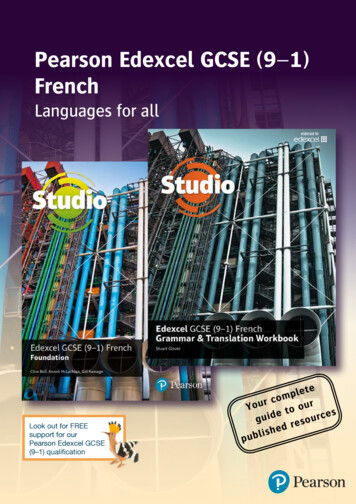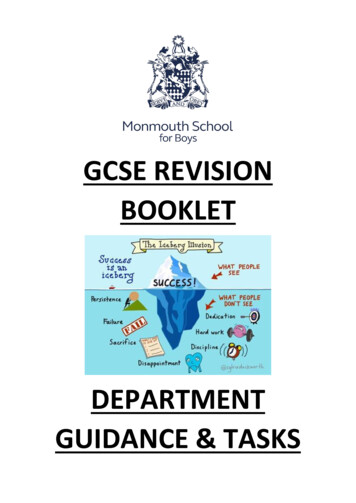
Transcription
GCSE REVISIONBOOKLETDEPARTMENTGUIDANCE & TASKS
CONTENTS1. Exam checklist2. Exam planner3. Biology4. Chemistry5. Classics: Latin and Greek6. Computing7. Design Technology8. Drama9. English10.Geography11.History12.Maths13.MFL: French, German, Spanish14.Music15.Physics16.Religious Studies
EXAM PREPARATION - Check ListHere are some things to think about as you prepare for the upcoming exams. Make sure you have a copy of your exam timetable. Pin it on your desk/notice board. Make sure you have a revision timetable. You may wish to dedicate more time to thesubjects you find most difficult. Start early – this will give you time to ask your teachers for help if there is a topic you do notfully understand and will allow you to revisit topics just before the exam. Work out what kind of learner you are –visual?/auditory?/kinaesthetic? What revisionstrategies can you use? Your tutor will go through this with you. Remember there is no right and wrong way to revise. This is your opportunity to try outdifferent revision techniques and work out what works for you.Before and during the examination period; Make sure you have a supply of black biros.Make sure you have a green pen if you need extra time (you can ask for one at thebeginning of the exam)Leave your mobile phone locked away in your study. If you do take it to the exam roommake sure you switch it off and give it to the invigilator.Enter and leave the exam room in complete silence. Remember as you are leaving someextra time candidates will still be working.It is a good idea to take a bottle of water to the exam room with you.If you have a pencil case this should be clear see through plastic.Bilingual dictionaries can be used by non-native English speakers but not for the Englishexam.And finally always ask for help/clarification if you aren’t sure about something.Good Luck!
PREPARING & COPING FOR YOUR EXAMS SLEEP: NHS guidelines: 14-16 years olds need 8- 9 hours sleep a night. This is an essential – atired brain won’t work very well and can lead to feelings of stress and anxiety.Stressed & can’t sleep? Warm bath, relaxation exercises & stretches, read a book, listen tomusic.Breathing exercises: sion/Pages/waysrelieve-stress.aspxReduce screens in your bedroom: TVs, tablets, computers - especially before bedtime.Research has proved using an electronic device, even an hour before bedtime, badly affectsboth the onset of sleep and sleep duration.Don’t revise on your bed – keep it as a calm sanctuary! If you do you risk falling asleep overyour textbooks. Want a change of scenery? Make a comfortable spot on the floor, in thegarden with cushions instead! EXERCISE: Regular exercise helps you sleep more soundly, as well as improving your generalhealth. Teenagers should be aiming for at least 60 minutes every day, even a brisk walk. FOOD: Cut out the caffeine. Don’t binge eat too close to bed time – especially notconvenience sugary snacks! Opt for healthy snacks between revision & before bed. E.gveggie sticks (carrots, peppers, cucumber with humous), a handful of nuts, mixed nits withfruit, berries & bananas, wholewheat, multigrain toast etc – you know what’s good grub!Always have a bottle of water on your desk. ROUTINE: Morning and evening routines are important – they help you to begin and endyour day calmly (e.g. prepare desk/books for the next day,). Revision routines need to be putin place so you don’t put it off. Embrace the job of revision and get it done early – you’ll feelvery satisfied with an hour or two under your belt by midday! A revision schedule might looklike this:8am up & breakfast8.45-9.30 topic 19.30-9.40 drink (the act of moving to make one will re-energize you even if it’s awater!)9.40-10.30 long question practice10.30 -10.45 fruit snack & drink10.45-11.30 topic 211.30-11.50 short question practice11-50-12.30 exercise – walk/run/ you-time12.30-1.30 lunch etc etcWhen making a revision timetable first decide on the template that you know works for you, thenadd in the subjects & topics into those time slots. (e.g. if watching lunchtime Neighbours is yourholiday must-see, then accept that you are a Neighbours addict & fit your work around it!)
Warning: revising straight after food on a full stomach can be hard and might make you feelsleepy.you may want to go for a short walk first! MINDSET: Revision in the holidays: Science says willpower is highest in the morning . sostart strong! If you revise in the morning you can free up afternoon time to exercise, havefree time and it will be guilt-free and you will feel a sense of satisfaction that you havealready achieved a lot. TO-DO LISTS: Writing to-do list’s helps! The act of drawing up a list and prioritizing the itemson it forces you to do a little extra work because you want to cross off the items you havelisted for your day. It also helps to break down the mammoth task of ‘revision’ intoachievable smaller chunks. (A to-do list has actually been written for you for each subject inthe form of the subject syllabus. Print it off, tac it to your wall, and for each part underline itwhen you first revise it, highlight on your second, cross out on your third etc!) REVISION TECHNIQUES:- Why is note-taking important? When you take notes, you need to filter externalinformation, summarise it in your head, and then write it down. Research has proventhat this note taking helps us to digest the information we hear and remember it betterthan we would if we’d just heard or read it.- Appropriate revision: Make sure you practice what you will be tested on – if it involveswriting an essay you need to practice essay writing!- Call a friend: revision needn’t be a solitary activity. Peer teaching is a highly effectiveway of processing information. Test each other, discuss, play games using key words(e.g. taboo).
EXAM CHECKLIST
EXAM PLANNER
APPS & WEBSITES: Great Ways to Create Flashcards and Test ssword: 60189459?mt roven-hacks-to-help-studentstackle-revision
deLength4BI1/1B2 hours4BI1/2B1 hour15minutesMarks11070%61.1DateContent14th MayAll content notin bold (seespiral boundrevision notes)7th JuneAll contentincluding that inbold (see spiralbound revisionnotes)38.9Question StyleA mixture of differentquestion styles, includingmultiple-choice questions,short-answer questions,calculations and extendedopen-response questions.Revision Resources already provided by your subject teacher: Revision guide (green book)Spiral bound revision notes (EKB – including core practical info and info on paper 1 and paper 2 content)’10 minute tests’ (white book)Revision workbook (white book)Spiral bound past paper packs (green and blue)Past paper question pack (handed out in December – answers on Firefly)Teacher specific revision resourcesWebsites:BBC q2j6fNB not IGCSE specific, so choose your revision topics carefullyAPBI 4-16S-cool:https://www.s-cool.co.uk/gcse/biologyMy GCSE Science:https://www.youtube.com/playlist?list PLsorq7UsrfYtaKW7S2dg0wTKq545WvBHnNB not IGCSE specific, so choose your revision topics carefullyFree Science Lessons: VG3 bwNB not IGCSE specific, so choose your revision topics carefullyFootprint lum/biology/gcse/year-11Revision tasks for the Easter holidayTriple award:2 x past paperDouble award: 1 x past paperAll Students: Past paper question pack (handed out in December – answers on Firefly)Teacher specific additional revision activities
CHEMISTRYPupils follow the Edexcel IGCSE (9-1) Chemistry course (code 4CH1). The specification can be 2017-specification1.pdfThere are 2 papers:Paper 1 (16nd May 2019, am) is 2 hours in duration and carries 110 marks. It assesses core contentthat is not in bold in the specification and contains a mixture of different question styles, includingmultiple-choice questions, short-answer questions, calculations and extended open-responsequestions.Paper 2 (12th June 2019, am) is a 1-hour and 15-minute written exam carrying 70 marks. It assessesall the content, including content that is in bold in the specification. Questions may come fromany topic area across the specification and contains a mixture of different question styles, includingmultiple-choice questions, short-answer questions, calculations and extended open-responsequestions.Pupils can access all the past papers, mark schemes and other useful resources on the school et/chemistryRevision tasks for the Easter holiday:Revise using your CGP Revision Guide, Past Paper Booklets, iGCSE Revision emistry/gcse/igcse-revision-ticklists) and iGCSE CorePractical Guide gcse/igcse-core-practicalguide) class notes and the textbook. Also make sure to use some of the resources on the link above. You have been given a bundle of past papers (in separate booklets for Papers 1 and 2) tocomplete. Ensure you have dedicated time in your revision timetable to: Complete these papers (at least 2 hours per paper); Mark and correct the papers (0.5 - 1 hour per paper); Revise the topics from the papers you found difficult. Use your CGP Revision Booklet to Make mind maps, condense notes and produce flashcards – whateverworks best for you to learn information. Make a list of any issues so youcan seek help from your teacher when you return to school.(General revision guidance, including advice on constructing a revision timetable and nutritionadvice, can be found at m/revision-guidancegeneral.)
CLASSICS: LATINSyllabus and Exam PapersWe have followed the Latin GCSE offered by EDUQAS (the name for WJEC in England). Syllabusdetails can be found here: http://www.eduqas.co.uk/qualifications/latinThe exams in the summer will consist of:Component 1 (50% of the GCSE) Exam on 13th May 2019:Latin Language (Translation and Comprehension)- 1 hour and 30 minutesComponent 2 (30% of the GCSE) Exam on 16th May 2019:Latin Literature and Sources – A Day at the Races - 1 hour and 15 minutesComponent 3 (20% of the GCSE) Exam on 20th May 2019:Useful websites: 71 for some extra resources forComponent 3 (Germanicus and Piso) http://classicstuition.com – Has some useful activities for GCSE Language – you will needto register but it is free. https://www.wjeclatinresources.com/ has lots of resources for all 3 componentsincluding the defined vocab list available in different formats (Word, PDF, Excel) and avery effective vocab drill which can be set as a more challenging English-Latin test or asimpler Latin-English test with the option of giving type-in or multiple choice answers. There are of course multiple resources for help in all component areas in the school U:drive. Here you will find copies of all the notes and materials we have used during thepast two years for literature as well as folders containing PPT explanations for all thegrammar constructions covered for Eduqas Latin GCSE.Over Easter focus on:Learn The Day at the Races and Germanicus and Piso texts including notes. Use the booklets ofquestions to help and the various PPTs as well.Learn Vocabulary using the wjec online drill mentioned above.Practise translations which have been provided by email including the Level 2 WJEC past papersfrom 2018 which are of equivalent difficulty to GCSE. I am more than happy to check any workthat is emailed to me over the holidays and to provide feedback via email.
CLASSICS: CLASSICAL ical-greek-j292-from-2016/Paper 1 – Friday 17th May 1.30pm 90 minutes: Greek Language: Translation and ComprehensionPaper 2 – Friday May 24th 9am 60 minutes: Prose Literature: HerodotusPaper 3 - Tuesday 4th June 1.30pm 60 minutes: Verse Literature: AlcestisGCSE Vocabulary (pdf. And Excel): : rodotus-handbook.pdfEuripides: ripides-handbook.pdfSample Papers: reek-j292-from2016/assessment/1. Learn thoroughly all the GCSE vocabulary, including the principal parts of verbs.2. Learn a translation of both set texts, Herodotus and Euripides.3. Complete at least five translations from the Language pack given out by DGH. These canbe emailed to DGH ( hope.david@habsmonmouth.org ) during the holidays to be marked.4. Read both OCR Student Handbooks on the set texts. Issued by DGH
COMPUTINGCambridge IGCSE Computer Science 0478Paper 1 1 hour 45 minutesTheory: 60% 75 marksShort answer and structured questionsQuestions based on section 1 of theSubject contentAll questions compulsoryNo calculators are permittedExternally assessedPaper 2 1 hour 45 minutesProblem-solving and Programming:40% 50 marks20 marks from questions on the pre-releasematerialShort answer and structured questionsQuestions based on section 2 of the contentAll questions compulsoryNo calculators are permittedExternally assessedGuidance1.2.3.4.5.6.7.8.Have a plan.Use it.In every revision session, create an artefact eg flash cards, mind map, précised notes, crib cards.Use past paper questions: they are often recycled.Use the mark schemes for ideal answers– see what the exam board deems mark-worthy.Do it Open Book first: reinforce your foundations. Then test yourself.Technical terms and definitions: learn them, know them, use them in your answers.Facts NOT fluff.ResourcesOneNote Content Library,Revision guide,Worksheets and model answersCIE Pseudocode guidePast Papers and Mark Schemes, andYour own notes.Revision BookYoutube.com Crash course computer scienceCraigNDave GCSE Computer SciencevideosFlash Cards, Mind MapsGoConqr.com https://www.goconqr.com orQuizlet https://quizlet.com
Revision tasks for the Easter holidayComplete your pseudocode algorithms, using the CIE guide to pseudocode, for:Buses Task 1Buses Task 2Buses Task 3Complete Past Papers:November 2016 Paper 1November 2016 Paper 2June 2016 Paper 1June 2016 Paper 2Bring all to our first lesson. Email LAH if you need help, or post on Teams.
DESIGN TECHNOLOGYLinksSyllabus: Edexcel - GCSE Design and Technology (9-1)Firefly: HabsMonmouth - Firefly, GCSE Design and TechnologyShared Drive (on the school network): Shared Universal (U) Drive – GCSE Design and TechnologyStudent Book (on the school network): Shared Universal (U) Drive – GCSE Design and Technology\Student BookCourse overviewComponent 1 – ExamComponent 2 – CourseworkWritten examination: 1 hour and 45 minutes50% of the qualification100 marksNon-examined assessment50% of the qualification100 marksThree contextual challenges will be providedby the board each year in June, from whichstudents must choose one to respond to.Students will produce a project, linked to theirspecialism, which consists of a portfolio anda prototype.The paper includes calculations, short-openand open-response questions as well asextended-writing questions focused on: analysis and evaluation of design decisionsand outcomes, against a technicalprinciple, for prototypes made by others analysis and evaluation of wider issues indesign technology, including social, moral,ethical and environmental impacts.There are four parts to the assessment:Part 1: InvestigatePart 2: DesignPart 3: MakePart 4: EvaluateThe exam paper is split into section A “core” and section B “material” categories.Section A: Core content40 marks, including 10 marks for calculationsThis section gives students the opportunity to demonstrate their understanding of how to take products tomarket and build a successful business. It covers aspects of new and emerging technologies, ethics andenvironmental impact, plus a broad overview of materials and tools used in design.Section B: Material categories (Timbers for Monmouth School for Boys)60 marks, including 5 marks for calculationsThis section concentrates on the students’ chosen material and allows them to show their specialistknowledge in the subject area they have a passion for from metals, papers andboards, polymers, systems, textiles or timbers.Revision tasks for the Easter holiday:1. Class notes - Complete any revision notes, revise and consolidate your knowledge2. Past Papers - Use the past papers you have already completed with markings andfeedback given by your teacher3. Revision cards - Condense your notes and information onto revision cards4. Mind maps - Organise your tools, materials, processes etc into sections and convertthese into mind maps. Aim for one topic per A3 page5. Firefly – Use the pages on Firefly to explain any topics you are unsure of6. Text book – Use your textbook as a guide to ensure you have covered everything in thesyllabus (Don’t forget the only material category we cover at MSB is Timbers)
DRAMAEduqas is the exam board.Component 3 – interpreting theatre is the title of the exam. You have one exam paper that is1hr 30mins – it is 40% of your overall GCSE mark.Section A is about War Horse - the total mark for this section is 45. You should have two 15mark essays and 5 smaller questions varying from 2 – 4 marks. However, they can vary. Last yearthere was a 10 mark design question; but they will always add up to 45.Section B is about live theatre – Splendid Theatre’s production of The Oresteia. The total marksfor this section is 15 and you will have an either/or choice from one question.Additional Guidance: Please use the past papers you have already completed with markings and feedback thatI gave you.Please use my analysis of the January mock exam paper.Please use your scene by scene guide to War Horse.Please use the exemplar papers given to you from last lendidproductions.co.uk/Revision tasks for the Easter holiday –Go back through past evaluations and end of Year 10 paper and January mock exam answers.Please answer the following question:Section B: This is about Splendid’s production of The OresteiaAnalyse and evaluate how vocal skills were used in two key scenes to communicate meaning to the audience.In your answer refer to: The acting styleHow vocal skills were used to create character and communicate meaningYour response to the performance as an audience member(15 marks)
ENGLISHLanguage GCSE (0627)Literature GCSE us.pdfREVISE YOURSPaG!Revision tasks for the Easter holidayLanguage:Read and complete all past papers in conjunction with mark schemes provided. Make close reference to timingsand available marks. Work through the Language exam checklist provided by your teachers.Read pack of Victorian extracts, revising contextual information and looking up less familiar language. Readmagazine and newspaper articles for purpose, audience and language.Literature:Re-read ‘Romeo and Juliet’, ‘Hard Times’ (extract to whole) and ‘A View from the Bridge’ (character and theme).Learn necessary quotations and context.Re-read/re-annotate all 15 poems from the anthology incorporating necessary context.Complete unseen comparisons from the past paper pack in line with your teacher’s recommendations.Follow all other guidance and complete all tasks as set by your class teacher.See Firefly for duplicate materials.
raphical Skills are assessed across all 3 papers (Cartography: map & photo; graphs; numeracy; statistics; use of data).Your final grade is 10% on maths and statistical skills and 5% on spelling, punctuation & grammar (SPaG).PAPER 1 Living with the PHYSICAL Environment Topics: 21st MayExam Time: 1 ½ hrs88 marks in totalIncluding 3 marksfor SPaG(Spelling, punctuation &grammar)35% of GCSE markQuestion styles:Multiple choice; Shortanswers; calculations;open response;extended writtenargument with evidencedpoint & informedconclusions.MarksSection A Question 1: Challenge of NATURAL HAZARDS1) Natural Hazards2) Tectonic Hazards (Eg HIC & LIC contrasting Effects & Responses)3) Weather Hazardsa) Tropical Storms (Eg Effects & Responses)b) UK Extreme Weather (Eg Cause, Impact & Management)c) Climate ChangeSection B Question 2: LIVING WORLD1) Ecosystems (Eg Small scale UK ecosystem)2) Tropical Rainforests (CS Causes of deforestation, Impacts & Issues)3) Hot Deserts4) Cold Environments CS development opportunities & challenges0102 33 marks Answer all questions. Last question (9) is 9 marksplus 3 marks for SPaG. 25 marks (9 marks for HotDesert) Answer all questions.You are not studying this! Section C Questions 3-5: Physical LANDSCAPES in the UKQu 3) UK Coastal Landscapes Don’t do! Qu 4) UK River Landscapes (Eg x2 Landform & management)Qu 5) UK Glacial Landscapes (Eg x2 Landform & management)0304 30 marks (15 each) ONLY Question 4 & 5PAPER 2 Challenges in the HUMAN Environment Topics: 5th JuneSection A Question 1: URBAN Issues & Challenges1) Urban World2) Urban growth in LIC City88 marks in total(CS: Lagos Causes, opportunities & challenges. Eg Planning)Including 3 marks3) Urban Change in UKfor SPaG(CS: Importance, migration, opportunities & challenges. Eg Regeneration)(Spelling, punctuation and4)Urban Sustainabilitygrammar)Section B Question 2: Changing ECONOMIC world35% of GCSE mark 1) Global development gap2) Reducing the global development gap (Eg Growth in tourism)Question styles:3) NEE Rapid Economic development (CS Nigeria: social, environ & culture)Multiple choice;short-structured answers; 4) UK Economic Futures (Eg Industrial sustainability)cloze exercises,Section C Questions 3-4: Challenge of RESOURCE MANAGEMENTphoto interpretation/Qu 3) Resource Management (14 marks)0 3description,interpretation of maps on Qu 4) Food (11 marks Eg)Qu 5) Water Don’t do! different scales,0 4data responses,Qu 6) Energy Don’t do! Exam Time: 1 ½ hrsMarks 010233 marksAnswer all questions.Last question (8) is 9marks plus 3 marksfor SPaG. 30 marks Answer all questions. 25 marks Answer ONLYQuestion 3 & 4longer extended writing.PAPER 3 Geographical Applications: 12th JuneExam Time: 1 ¼ hrs76 marks in totalIncluding 6 marksfor SPaG(Spelling, punctuation andgrammar)30% of GCSE marksSection A: Issue Evaluation on Pre-Release materialQuestions based on pre-released material (12 wks before exam).Topics on any of the compulsory sections of Paper 1 & 2.Critical thinking & problem solving & Geographical skills.Section B: Fieldwork on 2 compulsory human & physical topics(15% of final grade). Fieldwork to include the Enquiry process:1) Identifying suitable question; 2) Select, measure & record data;3) Process & Present data; 4) Describe, analyse & explain results;5) Reach conclusions; 6) Evaluate geographical enquiryMarks 37 marks Answer all questions. Last question is 9 marksplus 3 marks for SPaG. 39 marks Answer all questions. Last question is 9 marksplus 3 marks for SPaG.
Revision Resources and Further Support1. Your own notes should be the basis of your revision, alongside your textbook and greenrevision guide.2. There is a substantial amount of revision material on Firefly, including revision briefs foreach topic, mindmaps, checklist of case study and examples and specimen rcesRevision tasks for the Easter holiday1. Get organised - be clear which topics are in which exam. Then organise and prioritiseyour revision accordingly.2. Revision cards- Condense your notes and information onto revision cards3. Mind maps - Organise your case studies or topic notes onto the mind map outlines -resources/mindmaps4. Memorise! Now you have condensed your class notes you need to memorise them.Good memorisation, in my experience comes down to two things: Repetition Using the information in different formats.5. Read through the pre-release which you have been given before the end of ces/pre-releaseNOTE: We will review the pre-release in the first two weeks of the summer term6. Complete the specimen material papers and check against mark schemes from ources/specimen-papers
HISTORYPaper One is on Wednesday 8th May. It is a two hour paper testing your knowledge ofInternational Relations 1919-1939 and the USA 1918-1941.Paper Two is on Friday 17th May. It is a two hour paper testing your ability to analyse sources onthe topic of American containment during the Cold War.The syllabus for both papers in in the Revision Booklets here:: m/history/gcse/revision-bookletpaper-oneFor Paper One and Paper Two use the Revision Booklets and Past Papers which can be found onFirefly here:: m/history/gcse/revision-booklet-paper-oneThere are also links to useful revision sites here.Revision tasks for the Easter holidayFocus on Paper One. This is the material you have learned for last summer’s Year 10 exam andagain for your January mock exam. This is the third time you have learned it so go through andfind out what you need to know better. Test your knowledge by planning answers to the PastPaper questions. Check your answers with the Mark Schemes.For Paper Two read through the ‘content’ in the revision booklet. Check you understand whathappened in the three topics, but you do not need to know the detail so forensically. Do gothrough the Past Papers and the Mark Schemes to practise recognising what each type ofquestion requires.
MATHEMATICSThe Mathematics syllabus and information about the exam papers:The specification for the Mathematics Edexcel IGCSE (9-1) can be found ml although you will find it easier to use the2 internal IGCSE workbooks that we have used to teach the course to find the list of topics thatyou need to revise. There are 2 papers, each of 120 minutes, with 100 marks on each paper. Thereis no specific syllabus content for each paper so any of the topics can come up in either of thepapers, although it is unusual for the same topic to be tested in both papers in a single sitting. Youare allowed a calculator for each paper, but there may be some questions where you areinstructed not to use one, to ensure that methods are clearly understood and full workings areshown.Revision tasks for the Easter holiday:Practice papers: You have been issued with a pack of past papers by your set teachers with eachset given the pack of past papers that best suits their needs. To ensure that you can check yourprogress your teachers will have either given you worked solutions or will email them to you. Itwould also be a good idea to look through the other past papers that you have already done,familiarising yourself with as many different types of exam questions that you possibly can. Pleasenote that more papers are available on the link shown above.Timed conditions: it might be a good idea to do at least one of the papers that you have beengiven under timed conditions, although it would be sensible to return to the paper later to try tosolve any of the questions that you failed to solve the first time around before you check youranswers against the worked solutions.It would also be a good idea for you to make a list of questions / topics that you are unsure aboutahead of next term. You can ask your teachers to help you or attend Maths surgeries. Please notethat Maths surgeries will continue to be available to you when you are on study leave.In addition to practice papers: Do also make good use of the various CGP study guides that youhave been issued with. More revision materials can be found on the following websites:www.mathsgenie.co.uk and https://corbettmaths.com/ but please note that this material is notexam board specific.
MODERN FOREIGN LANGUAGES: FRENCH, GERMAN, SPANISHLink to the syllabus and a brief reminder about each exam paper – title, structure, timings, contentFrench, Spanish and German- AQA GCSE PAPER 1- LISTENING (25%)Written exam: 35 minutes (Foundation Tier), 45 minutes (Higher Tier)40 marks (Foundation Tier), 50 mark
your day calmly (e.g. prepare desk/books for the next day,). Revision routines need to be put in place so you don't put it off. Embrace the job of revision and get it done early - you'll feel very satisfied with an hour or two under your belt by midday! A revision schedule might look like this: 8am up & breakfast
